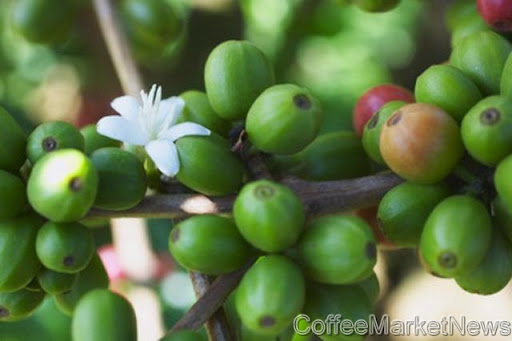 * Weather, global market boosts prices
* Weather, global market boosts prices
* Buyers turn to other producers regionally
By Helen Nyambura-Mwaura
KOMOTHAI, Kenya, March 7 (Reuters) - In Kenya's coffee growing area of Komothai, record prices at auction have farmers dreaming of a better future and driving to improve their crop.
Record high commodity prices have rattled finance ministeries in the West, but poor growers see things differently -- especially in Kenya where reforms now mean more profits trickle down to them.
Coffee from the local co-operative society fetched $1,011 per 50-kg bag in January, a heady price for any coffee farmer around the world.
"Now you can build a house, you can pay school fees, you can buy inputs. Before this, you couldn't do any of that," said Duncan Kimani, 52, pruning excess twigs off bushes with green berries that will be ready for harvest in April.
"Now we can live like humans."
Kenyan coffee prices have hit records this year -- climbing as high as $1,022 per bag -- because of high prices internationally and on a squeeze in the local supply.
But that has a double edge: encouraging farmers to pay more attention to their coffee but are also deterring buyers, who are turning to specialty beans from other countries in the region.
Small-scale coffee farmers complain perennially that they do not receive the rightful share of earnings, with the bulk going to middlemen such as millers or exporters.
Some have neglected their coffee trees or chopped them down altogether and taken up dairy farming in frustration at years of hard toil with no returns.
But government-led reforms may be finally taking root and turning around the lot of some farmers. According to new rules, co-operatives can keep only 20 percent of net sales and must pass on the rest to farmers.
Growers are also replacing corrupt co-operative officials that siphoned their cash, which is also beginning to bear yields in places such as Komothai.
"Farmers are very proud that we managed $1,011 per bag," said Moses Mbugua, a member of Gathiruini factory, one of the 13 factories that makes up the Komothai's growers society.
"Farmers have agreed to go back to tending their coffee farms to get a good crop."
Gathiruini factory paid farmers 44.60 shillings for every kg of raw cherry they produced after selling clean AA grade coffee at $275 per bag.
VAGARIES OF WEATHER
Neighbouring Githongo factory paid out paid 60.70 shillings having sold their early crop at $436 for each bag.
Farmers are now eagerly anticipating healthy returns from the higher prices from the main crop, including the $1,011 sold earlier this year.
"Ten years back 10 shillings was the best you could get for a kg of cherry," said farmer Kimani. "We have hope now the coffee industry will change."
But the high prices have a downside. They deter regular buyers and are affordable only to specialty roasters that sell single-origin coffee.
"Roasters are keeping off our coffee and a lot of them are turning to mild arabicas from the region, which are way cheaper," said Isaac Muchomba, executive secretary at the Kenya Coffee Traders Association (KCTA).
"We've actually seen roasters who buy top end not buying at all."
Excessive rain at the start of 2010 -- normally a dry season necessary for flowering -- hampered growth and is the reason for the low quantity of beans available for sale.
Coffee formed then was harvested over September-December and is in the market now.
The International Coffee Organisation expects unfavourable weather conditions in major coffee-producing regions to increase the global supply uncertainty.
Kenya's coffee production contracted by about 26.6 percent to 42,096 tonnes in the season concluded in September 2010, according to KCTA statistics.
The Nairobi Coffee Exchange that conducts weekly sales may break off as early as April for an annual month-long recess that normal takes place in July-August, KCTA said.
"The climate has changed so much that there is no clear season any more when the flowering or the harvesting will take place," said Muchomba. "Some estates are harvesting all the time."
(Source: http://af.reuters.com/article/burundiNews/idAFLDE70O13O20110307?sp=true)

No comments:
Post a Comment